

No, You Are Not a DevOps Engineer. Cloud Foundry: Life Is Too Short Pivotal’s public cloud version of Cloud Foundry really struggles with the loose integration of third-party services.
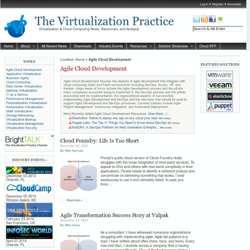
To appeal to ISVs and others with real-world complexity in their applications, Pivotal needs to identify a coherent product and concentrate on delivering something that works. I tried assiduously to use it and ultimately failed. In case you think… Read more » Agile Transformation Success Story at Valpak As a consultant, I have witnessed numerous organizations struggling with implementing agile. What is DevOps? Adrian Cockcroft’s article about NoOps at Netflix ignited a controversy that has been smouldering for some months.
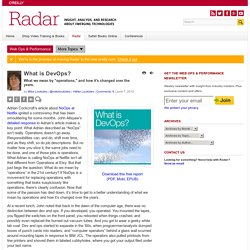
John Allspaw’s detailed response to Adrian’s article makes a key point: What Adrian described as “NoOps” isn’t really. Operations doesn’t go away. Responsibilities can, and do, shift over time, and as they shift, so do job descriptions. But no matter how you slice it, the same jobs need to be done, and one of those jobs is operations. What Adrian is calling NoOps at Netflix isn’t all that different from Operations at Etsy. At a recent lunch, John noted that back in the dawn of the computer age, there was no distinction between dev and ops. The arrival of minicomputers in the 1970s and PCs in the ’80s broke down the wall between mainframe operators and users, leading to the system and network administrators of the 1980s and ’90s. But somebody has to keep the infrastructure running, including the increasingly important websites. So infrastructure had to become code. Devops: what it is and why you should be doing it. This could be brogramming.
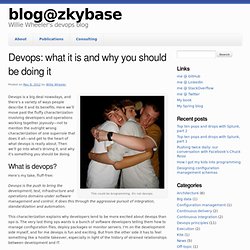
It's not devops. Devops is a big deal nowadays, and there’s a variety of ways people describe it and its benefits. Here we’ll move past the fluffy characterization involving developers and operations working together joyously—not to mention the outright wrong characterization of one superrole that does it all—and get to the heart of what devops is really about.
DevOps: Adapt or Die. Two bloggers have stimulated a flurry of activity in Sysadmin and DevOps communities recently with their similar conclusions about the ongoing fall of traditional system administration and the arrival of (you guessed it!)
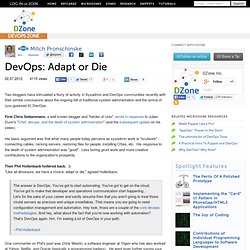
DevOps. First Chris Siebenmann, a well known blogger and "herder of Unix", wrote in response to Julian Dunn's "Chef, devops, and the death of system administration" (and the subsequent update on his views) His basic argument was that what many people today perceive as sysadmin work is "scutwork" - connecting cables, racking servers, restoring files for people, installing OSes, etc. His response to the death of system administration was "good". Less boring grunt work and more creative contributions to the organization's prosperity. Then Phil Hollenback hollered back. :) "Like all dinosaurs, we have a choice: adapt or die," agreed Hollenback.
The answer is DevOps. Finally, the blogging came full circle when Chris Siebenmann responded to Phil Hollenback. DevOps Zone. Alec Noller Dev of the Week: Steve Smith Every week here and in our newsletter, we feature a new developer/blogger from the DZone community to catch up and find out what he or she is working on now and what's coming next.

This week we're talking to Steve Smith, Agile consultant and Continuous Delivery specialist at Always Agile Consulting Ltd. Benjamin Ball DZone Weekly Link Roundup (April 15) This week's link roundup includes Chef's new Microsoft Azure integrations, Cassandra hits one million writes per second, Hadoop has a new search engine, utilizing continuous delivery, the 30 best tools for data visualization, and an answer to why Unreal Engine 4 uses C++.
Continuous Delivery: Visualized For DZone's 2014 Guide to Continuous Delivery we created this detailed infographic to illustrate the creation of deployment pipelines. Paul Reed Whose Function is It Anyway? Puppet vs Chef, Fight. PDF : JohnAllspaw_DeployingThingsAllTheTimeDevAndOpsCooperationAtFlickrAndEtsy. DevOps : le mouvement qui tend à “Agilifier” votre DSI. La communauté « DevOps » nous invite à repenser la frontière classique de nos organisation, séparant d’un côté les études, i.e. ceux qui écrivent le code (le “Build”) et de l’autre côté la production, i.e. ceux qui déploient et exploitent ces applications (le “Run”). 2 groupes se retrouvent dans le mouvement DevOps et apportent un peu de fraicheur dans ces réflexions aussi anciennes que les DSIs : les agilistes qui ont levé la « contrainte » côté développement, et sont maintenant capable de « livrer » beaucoup plus souvent du logiciel valorisé par le client…mais regrettent que « la prod ne suive pas »des experts ou des managers de la « prod » des grands du web (Amazon, Facebook, LinkedIn…) partageant leurs retours d’expérience sur leur façon d’envisager cette frontière Au delà des fractures organisationnelles, les préoccupations des études et de la production sont bien distinctes et respectivement louables.

DevOps ou le Lean appliqué aux activités IT du développement à la production. On a maintenant l’habitude de voir des principes du Lean Management derrière beaucoup des pratiques Agiles.
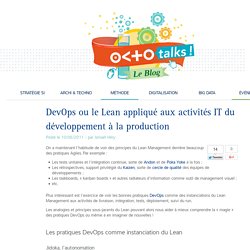
Puppet, Cfengine ou Chef & devops. Pour faire suite à l’article d’introduction sur le mouvement des DevOps, nous pressentons que, dans leur lourde tâche, nos héros vont devoir s’appuyer sur un certain outillage leur permettant de fluidifier la phase de Mise En Production ; qui dit fluidification dit appli déployée plus vite et le business traduit ça par : « la fonctionnalité va arriver bien plus vite au client ».

Et le business aime ça. L’utilisation du shell est une solution, mais qui montre ses limites. Il est temps de faire appel à d’autres outils. DevOps - Wikipedia EN. Devops - Wikipédia FR. Qu'est-ce que devops - devops.fr. What Is This Devops Thing, Anyway? What problems are we trying to solve?
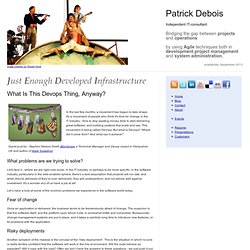
Let's face it - where we are right now sucks. In the IT industry, or perhaps to be more specific, in the software industry, particularly in the web-enabled sphere, there's a tacit assumption that projects will run late, and when they're delivered (if they’re ever delivered), they will underperform, and not deliver well against investment. What is DevOps not? I’ve spent the last two weeks at conferences, and for some reason people keep assuming that I work in operations.
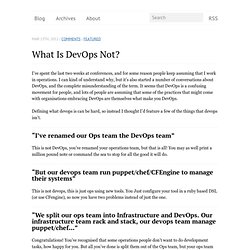
Jedi - le blog de Patrick Debois. While working on the Devops Cookbook with my fellow authors Gene Kim,John Willis,Mike Orzen we are gathering a lot of "devops" practices. For some time we struggled with structuring them in the book. I figured we were missing a mental model to relate the practices/stories to. This blogpost is a first stab at providing a structure to codify devops practices. The wording, descriptions are pretty much work in progress, but I found them important enough to share to get your feedback. Devops Areas - Codifying devops practices. While working on the Devops Cookbook with my fellow authors Gene Kim,John Willis,Mike Orzen we are gathering a lot of "devops" practices. For some time we struggled with structuring them in the book. I figured we were missing a mental model to relate the practices/stories to.
This blogpost is a first stab at providing a structure to codify devops practices. The wording, descriptions are pretty much work in progress, but I found them important enough to share to get your feedback. Devops in the right perspective As you probably know by now, there are many definitions of devops. I've started reffering to :